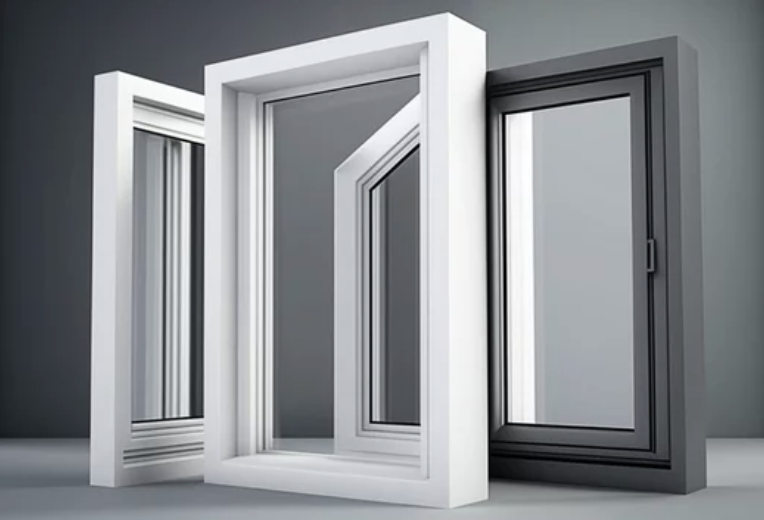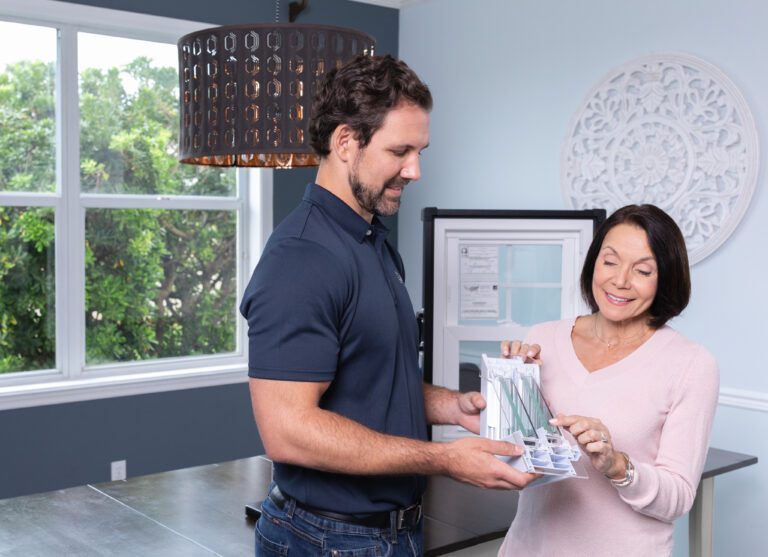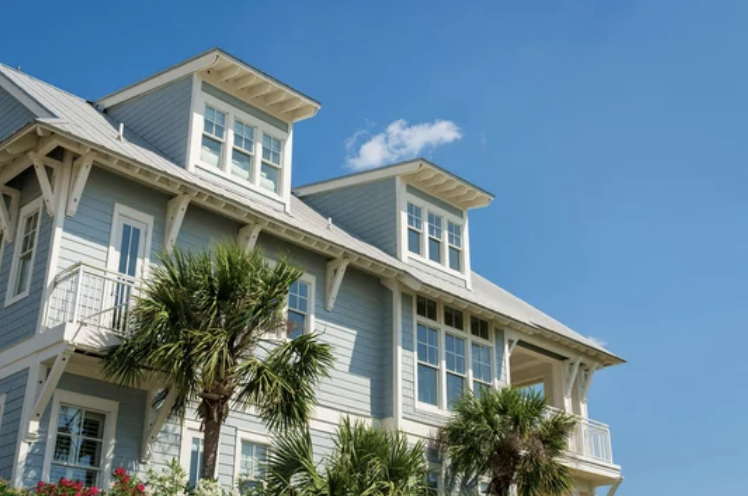When selecting windows for your Jacksonville, Florida, home, it's essential to consider the local climate and environmental conditions. Jacksonville's climate is generally warm and humid, with the risk of hurricanes and tropical storms. Here are some considerations for choosing windows in such a climate:
-
Impact-Resistant Windows: Given the risk of hurricanes and strong storms in Florida, it's advisable to choose impact-resistant windows. These windows are designed to withstand high winds and impact from debris, providing added safety and protection during storms.
-
Low-E Glass: Low-emissivity (Low-E) glass can help reduce the transfer of heat and UV rays into your home. This can be beneficial in a warm climate like Florida, helping to keep your home cooler and potentially lowering your energy bills.
-
Energy Efficiency: Look for windows with a high energy efficiency rating. This includes features like double-pane or triple-pane glass, insulated frames, and low-conductance spacers. Energy-efficient windows can help maintain a comfortable temperature inside your home and reduce the load on your cooling system.
-
UV Protection: UV-resistant coatings on windows can help protect your furniture, flooring, and other belongings from the damaging effects of UV rays. This is particularly important in a sunny climate like Florida.
-
Material Selection: Consider the material of the window frames. Materials like vinyl and fiberglass are resistant to moisture and humidity, which can be beneficial in a humid climate. These materials are also low-maintenance and durable.
-
Ventilation: Opt for windows that allow for good ventilation. Given the warm climate, having windows that can facilitate airflow is important for comfort. Consider styles like casement or awning windows that can capture breezes effectively.
-
Hurricane Shutters or Impact Screens: In addition to impact-resistant windows, consider installing hurricane shutters or impact screens. These can provide an additional layer of protection during severe weather events.
-
Local Building Codes: Always check and adhere to local building codes and regulations when installing windows. In Florida, there may be specific requirements for windows to ensure they meet safety standards, especially in hurricane-prone areas.
What is the best U-Factor for Jacksonville Replacement Windows?
The U-factor is a measure of how well a window insulates. It quantifies the rate of heat transfer through the window, with lower U-factors indicating better insulation. In warmer climates like Jacksonville, Florida, where cooling is a significant concern, you generally want windows with lower U-factors to help keep the heat outside.
The U.S. Department of Energy recommended U-factors vary based on climate zones. Jacksonville is in Climate Zone 2. For this zone, the recommended maximum U-factor for windows is typically 0.30.
However, it's important to note that building codes and energy efficiency standards may have changed since then, and it's always a good idea to check with local authorities or consult with a window professional who is aware of the latest requirements.
When shopping for windows, you might also want to consider other factors such as solar heat gain coefficient (SHGC), visible transmittance (VT), and air leakage. These metrics provide additional information about the window's performance in terms of heat gain, natural light transmission, and air infiltration.
In summary, for a warm and humid climate like Jacksonville, look for windows with a low U-factor, ideally below 0.30, and consider other relevant performance metrics to ensure that the windows meet the specific needs of your location.
What is the best R-Value for window replacements?
The R-value is a measure of the thermal resistance of a material, indicating how well it insulates. In the context of windows, it's a measure of the window's ability to resist heat flow. Higher R-values indicate better insulation.
-
Triple-Pane Windows: Triple-pane windows generally have higher R-values compared to double-pane windows because they have an additional layer of glass and often include insulating gases (such as argon or krypton) between the panes. The extra layer of glass and the insulating gas contribute to better thermal performance.
-
Low-E Coatings: Windows with Low-E (low emissivity) coatings can improve their R-values. Low-E coatings are thin metallic layers on the glass that reflect infrared heat while allowing visible light to pass through. This helps in maintaining indoor temperatures by reducing heat transfer.
-
Gas Filled Windows: Windows filled with insulating gases, such as argon or krypton, between the glass panes can improve the R-value. These gases are denser than air, reducing heat transfer.
-
Insulated Frames: The material and design of the window frame can also influence the overall R-value. Materials like fiberglass and vinyl are known for their insulating properties. Some window frames have thermal breaks or insulation within the frame structure to reduce heat conduction.
-
High-Quality Installation: Even the most energy-efficient windows may not perform optimally if they are not installed properly. Proper installation, including sealing gaps and ensuring airtightness, is crucial for maximizing the energy efficiency of windows.
When selecting windows based on R-value, it's essential to consider the specific needs of your climate. In colder climates, a higher R-value is typically more critical, while in warmer climates, other factors such as solar heat gain coefficient (SHGC) might be more relevant.
Keep in mind that while R-value is an important factor, it's not the only consideration. Other factors such as U-factor, solar heat gain coefficient, and visible transmittance also play a role in determining a window's overall energy efficiency and performance in different climates.
Are energy-efficient windows worth purchasing?
Yes, investing in energy-efficient windows can be worth it for several reasons:
-
Reduced Energy Costs: Energy-efficient windows are designed to minimize heat transfer, helping to keep your home cooler in the summer and warmer in the winter. This can result in lower energy bills as your heating, ventilation, and air conditioning (HVAC) system doesn't have to work as hard to maintain a comfortable temperature.
-
Improved Comfort: Energy-efficient windows can contribute to a more comfortable living environment by reducing drafts and maintaining a consistent temperature inside your home. This can enhance your overall comfort and reduce the need for constant adjustments to your thermostat.
-
Environmental Benefits: By reducing your energy consumption, energy-efficient windows contribute to a lower carbon footprint. Using less energy helps decrease greenhouse gas emissions, contributing to environmental sustainability.
-
UV Protection: Many energy-efficient windows come with coatings that block a significant portion of ultraviolet (UV) rays. This not only protects your furniture, flooring, and other belongings from sun damage but also reduces the fading of interior surfaces over time.
-
Resale Value: Energy-efficient features, including windows, can add to the resale value of your home. As energy efficiency becomes a more significant consideration for homebuyers, having efficient windows can be an attractive selling point.
-
Government Incentives: In some regions, there may be government incentives, tax credits, or rebates for installing energy-efficient windows. These financial incentives can help offset the initial cost of upgrading your windows.
-
Noise Reduction: Energy-efficient windows, especially those with multiple panes and insulating features, can help reduce outside noise, providing a quieter and more peaceful living environment.
While energy-efficient windows may have a higher upfront cost compared to standard windows, the long-term savings on energy bills and potential incentives can make them a cost-effective investment over time. It's essential to consider your specific climate, local building codes, and the overall energy efficiency of your home when choosing windows. Consulting with a Wallaby Windows professional can help you make informed decisions based on your specific needs and budget.


